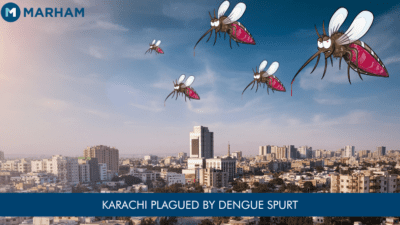The monsoon season’s torrential rains coincided with an increase in dengue cases that have overrun hospitals in major cities, making mosquito buzzing a source of dread for locals.
Alarmingly, dengue hemorrhagic fever is discovered in 75% of people who attend hospitals for medical advice for fever, body aches, pain, and rashes.
Dengue fever infections doubled in only two days, from 201 cases on Wednesday to 403 cases on Friday, according to data given by the Sindh health department.
Hospitals in District East (116) reported the majority of these cases, followed by those in Korangi (107), Malir (26), West (12), Central (72), Keamari (nine), and South (61).
This month, there were 2,145 dengue fever cases reported in Karachi, with East (842) having the most instances, followed by healthcare facilities in South (377), Malir (93), Keamari (64), Korangi (286), and West (431).
In the remaining parts of Sindh, 16 instances were reported in the divisions of Hyderabad, Larkana, Sukkur, and Shaheed Benazirabad.
According to a representative of the health department, the majority of dengue patients had moderate symptoms and either presented to private clinics or the outpatient divisions of hospitals.
However, hospitals do not keep accurate records on their OPD patients, and family doctors and the city’s laboratories are not compelled to disclose their data under the procedure that is now in place.
Since only severe dengue cases necessitate hospitalization, the official statistics do not accurately reflect the situation on the ground, the official claimed.
According to experts, the actual number of dengue fever cases could be five times greater than what the health service is now reporting.
Moreover. the health officials said that over 3,000 cases of malaria were reported on Friday.
The majority of them were identified as being in Hyderabad, specifically Tando Allahyar, Matiari, Jamshoro, Tando Muhammad Khan, Dadu, Thatta, Sujawal, Badin, Larkana, Shikarpur, Jacobabad, Kashmore, Qamber-Shahdadkot, Umerkot, Tharparkar, and Mirpurkhas.
According to health experts, the city’s drainage and sewerage system collapsed as a result of the lengthy and intense monsoon rains, covering entire neighborhoods in a foul-smelling slush that was mixed with sewage and serving as a breeding ground for mosquitoes.
Dengue and malaria, in particular, are currently being transmitted throughout the city by these mosquitoes.
Residents claim that municipal officials have neither fumigated mosquito breeding grounds or sprayed insecticides in the city’s most vulnerable locations to reduce mosquito populations-Source Dawn News
Karachiites are now doing everything they can to defend themselves against these disease carriers. Those who are suffering from dengue symptoms and want the best treatment should consult a Karachi dengue specialist as soon as possible.

